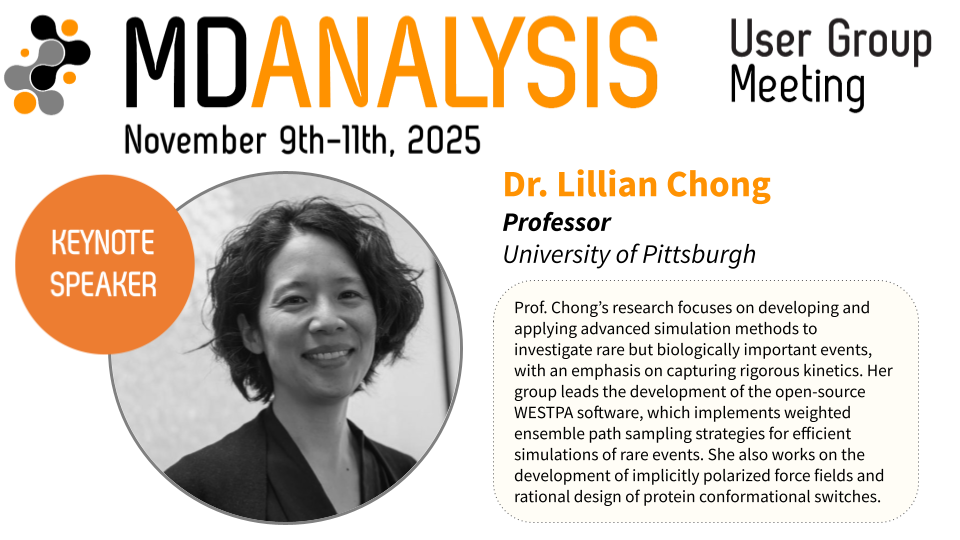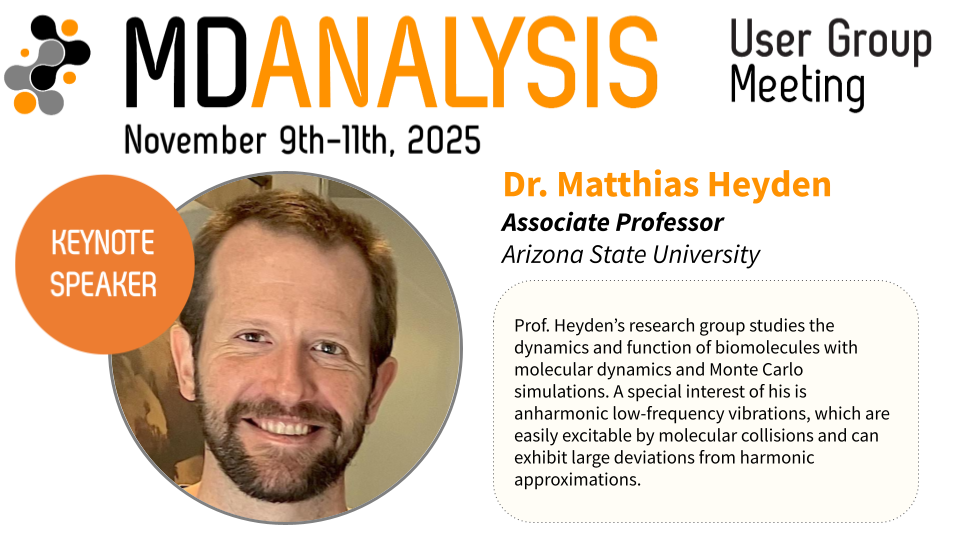15 Jul 2025
We’re excited to share updates for the upcoming 2025 MDAnalysis User Group Meeting (UGM), taking place November 9–11, 2025 at Arizona State University in Tempe, Arizona (USA). This in-person event unites a global community of users, developers, and researchers to discuss advancements in molecular dynamics analysis and to foster collaborations across disciplines. This year’s UGM will feature not only contributed talks from the community, but also insightful talks from our two keynote speakers, Drs. Lillian Chong and Matthias Heyden and hands-on workshops/tutorials. To accommodate continued demand from the community, we are now accepting registrations on a rolling basis.
Meet the Keynote Speakers
Dr. Lillian Chong

Dr. Lillian Chong, Professor of Chemistry at the University of Pittsburgh, leads the Chong Lab, where her team develops cutting-edge tools at the interface of chemistry, physics, and biology to investicate biomolecular dynamics and function. Her research group pioneered using weighted ensemble (WE) simulation techniques to study rare events, such as large-scale conformational changes and protein-protein binding, and for creating implicitly polarized AMBER force fields. Her work garned the 2020 Gordon Bell Special Prize for high-performance computing in COVID-19 research leveraging analyses that would otherwise take years but were achieved in weeks using WE and WESTPA, an open-source software for weighted ensemble path sampling.
Dr. Matthias Heyden

The second keynote, Dr. Matthias Heyden from Arizona State University’s School of Molecular Sciences, brings expertise in modeling solvation dynamics and vibrational energy transport in crowded biomolecular environments. His research integrates realistic atomistic simulations to illuminate solute-solvent interactions and energy transfer. His group has contributed to the development of interactive molecular dynamics (IMD) workflows through tools like IMDClient, enabling real-time streaming and manipulation of molecular trajectories. These capabilities, also showcased in the MDAnalysis IMD workshop materials, open new avenues for exploring simulations dynamically and interactively. This work enhances our understanding of biochemical processes in realistic settings, informing both simulation methodology and experimental interpretation.
Contributed Workshops
Alongside invited presentations, the 2025 UGM will feature community-led workshops that cover a range of tools and methods relevant to the MDAnalysis user base. Confirmed contributed workshops will include sessions from:
These workshops are a great opportunity to learn new skills and connect with fellow developers and researchers in the field.
Registration and Bursary Applications Now Rolling
We encourage all users, from first-time analysts to veteran contributors, to join us this November in-person in Arizona or to follow along with the online recordings. There are limited travel bursaries available. Registration is now accepted on a rolling basis, until participation limits are met. If you’re interested in attending or applying for support, we encourage you to submit as early as possible to maximize your chances of receiving a bursary and securing a spot. Visit the UGM 2025 page for full details and links to the application forms.
We look forward to seeing you there!
— The 2025 MDAnalysis UGM Organizing Committee
23 May 2025
We are proud to announce that MDAnalysis — in collaboration with Molecular Nodes, ProLIF, and WESTPA —
is hosting four Google Summer of Code (GSoC) contributors: @jpkrowe, @nilay-v3rma, @PardhavMaradani, and @yuyuan871111. MDAnalysis has been accepted as its own organization with GSoC
for the sixth year in a row. We are grateful to Google for granting us the opportunity to get started on these four very exciting projects!

James’ project is a collaboration between MDAnalysis and WESTPA, a toolkit for running Weighted Ensemble simulations. In Weighted Ensemble simulations, many short trajectories are run in parallel and evaluated after each iteration to identify those that have progressed along a predefined coordinate. This analysis step can become a bottleneck, as all trajectories must be loaded and processed before the next iteration can begin. The goal of this project is to use MDAnalysis’ trajectory streaming capabilities to analyze trajectories on-the-fly, reducing analysis overhead and decreasing the time between iterations.
James is a 3rd year PhD student at Imperial College London. His PhD project aims to use molecular dynamics to understand how mutations and modifications to the fundamental building blocks of bone, such as collagen, lead to increased fracture risk and compromised mobility. He has recently released an article on selective rupture in collagen and a review article that integrates experimental and computational advances in bone research.
You can find James on GitHub, LinkedIn and Bluesky.
To find updates on this project, check out his blog here!

Nilay’s project focuses on improving the 2D interaction visualizations in ProLIF, a tool for analyzing molecular interactions such as protein–ligand and protein–protein binding. He is enhancing LigNetwork plots by implementing graph-based algorithms to automate residue placement, reduce edge overlaps, and improve overall readability. Additionally, he is exploring the integration of visualization approaches from tools like InteractionDrawer and Flareplot to improve the visual representation of interactions. The goal is to create a more user-friendly and informative visualization tool for researchers.
Nilay is a sophomore at Indian Institute of Technology Gandhinagar (IITGN), pursuing a dual major in B.Tech Computer Science and Materials Science. He is passionate about computational materials science, machine learning, and generative AI and its applications.
You can find Nilay on GitHub, LinkedIn and his Portfolio.
To keep up with his work, you can check out his gsoc-blog.

MDAnalysis has a basic interface with Blender through a popular extension called Molecular Nodes, which allows importing MDAnalysis universes and provides advanced rendering capabilities through a GUI. The ability to script and support advanced visualizations of MDAnalysis results is currently limited. This project attempts to define, prototype and implement various APIs along with an integrated GUI within Blender as part of GGMolVis and Molecular Nodes that will together provide advanced visualization capabilities for MDAnalysis.
Pardhav is an undergraduate student from India pursuing a Bachelors in Computer Science and Engineering from Vellore Institute of Technology (Vellore) and a BS in Data Science and Applications from Indian Institute of Technology (IIT) Madras.
You can find Pardhav on GitHub @PardhavMaradani.
To see updates on this project, you can check out his blog.

ProLIF, a MDAnalysis/RDKit-based tool for identifying protein-molecule interactions in molecular dynamics trajectories, lacks a straightforward method for evaluating hydrogen bonds when only heavy atoms are present. This project introduces an “implicit hydrogen bond (H-bond) interaction method” directly using heavy atom positions to detect H-bonds. This new feature for ProLIF will help many users (especially, beginner-level programming users) compare their experimental and computational structures without explicit hydrogens.
Yu-Yuan (Stuart) graduated from National Taiwan University (Taipei, Taiwan), holding a Bachelor of Science in Agricultural Chemistry, a Bachelor of Engineer in Chemical Engineering, and a Master of Science in Biomedical Electronics and Bioinformatics. He worked on both wet-lab (WPI fibril microcapsules, SEA-PHAGE) and dry-lab (FastEval Parkinsonism, Quantum computing for drug discovery, MD simulations of SARS-CoV-2 omicron variants, Automated WGS(WES) reporting system) projects. Stuart currently studies for a PhD in UKRI-AIDD doctoral training programme in Richard W. Pickersgill’s and Arianna Fornili’s group at Queen Mary University of London (London, UK) to explore protein conformations with a computer-vision-based deep learning model. He is pursuing a career as a computational research scientist in drug discovery. During the free time, Stuart enjoys playing volleyball and badminton and sometimes visiting new places and cities with his family and friends.
You can find Stuart on GitHub as @yuyuan871111 and on LinkedIn. To keep up to date with his latest projects, check out his blog.
— @BradyAJohnston @cbouy @fiona-naughton @jeremyleung521 @ljwoods2 @ltchong @orbeckst @talagayev @yuxuanzhuang @IAlibay @jennaswa (@MDAnalysis/gsoc-mentors and org admins)
13 Apr 2025
We are pleased to announce the 2025 MDAnalysis UGM (User Group Meeting), taking place on the 9-11th November, 2025, in Arizona, USA at Arizona State University. Abstracts are welcomed from all areas relevant to MDAnalysis’s work, from scientific applications (e.g., biomolecular simulations, soft matter and materials science, drug discovery and more) to the use and development of open source software and tools for data analysis of molecular simulation output. Additionally this UGM will have sessions focusing on ongoing work towards enabling simulation streaming being undertaken at ASU (see our previous workshop on this topic). When submitting your abstract, you may indicate whether you prefer to give a 15 minute talk, 5 minute lighting talk, or poster presentation.
MDAnalysis strives to be a diverse and welcoming community for all. A limited number of travel bursaries are available to enable those facing financial barriers to attend and present their work. If you would like to apply, please follow the prompts on the abstract submission form.
The deadline for submitting your abstract and/or bursary application is July 15th, 2025. Submissions will be reviewed by the end of July 2025; we will contact applicants shortly after.
Follow the official event page on our website for the most up-to-date information about the UGM. If you have any questions or special requests, please contact [email protected].


